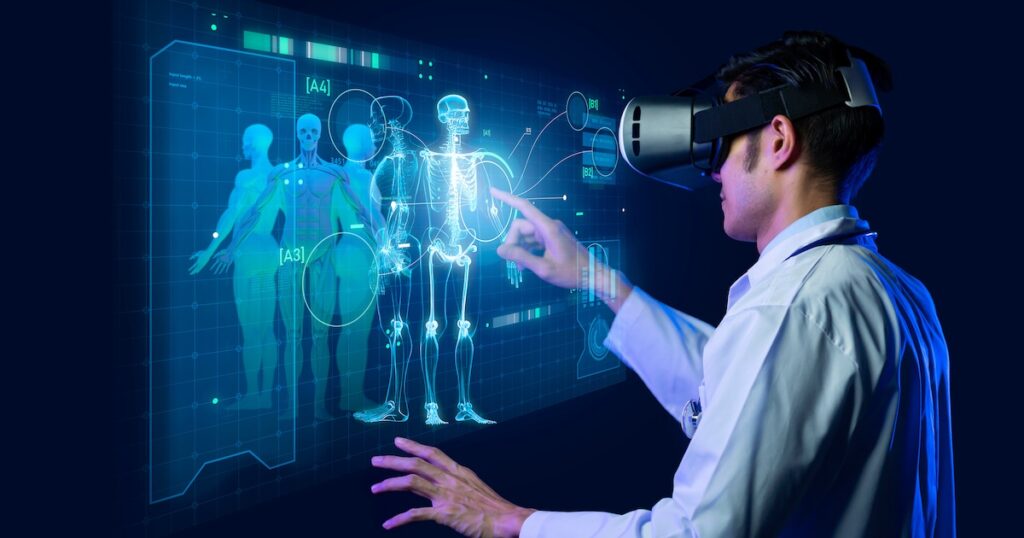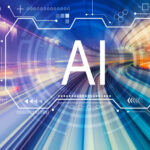AI’s Role in Revolutionizing Healthcare
The healthcare landscape is undergoing a profound transformation, driven by the rapid advancement of Artificial Intelligence (AI) technologies. In recent years, AI has emerged as a game-changer in the field of medicine, promising to revolutionize how we diagnose, treat, and manage diseases. This article explores the pivotal role that AI is playing in reshaping the healthcare industry.

Artificial Intelligence (AI) has been a topic of great interest and innovation across various sectors, and its influence in healthcare is particularly noteworthy. The integration of AI technologies in medical practices is offering new opportunities to enhance the efficiency, accuracy, and effectiveness of healthcare delivery.
The journey of AI in healthcare begins with data. With the advent of electronic health records (EHRs), an enormous amount of patient data is generated and stored. AI leverages this data to identify patterns, trends, and potential health issues that may go unnoticed by human healthcare providers.
AI’s proficiency in processing, analyzing, and interpreting data has made it a valuable asset in medical diagnostics. Machine learning and deep learning algorithms are being employed to sift through vast datasets of medical images, including X-rays, MRIs, and CT scans, to identify anomalies, tumors, and various health conditions with a high degree of accuracy.
The Power of AI in Medical Diagnosis
AI technologies, including machine learning and deep learning methods, are already making a significant impact on clinical imaging, disease detection, and prediction. We explore how these methods are improving medical practices.
Enhancing Clinical Imaging
One of the remarkable applications of AI in healthcare is the enhancement of clinical imaging. AI algorithms, such as convolutional neural networks (CNNs) and variational autoencoders, have proven to be highly effective in improving the accuracy and speed of image interpretation. For example, AI-driven models can help radiologists detect and classify abnormalities in medical images, reducing the chances of misdiagnosis and enhancing the overall quality of healthcare.

Disease Detection and Prediction
AI has demonstrated its prowess in disease detection and prediction. In the field of oncology, AI algorithms are used to analyze various data sources, including radiological images, genetic information, and patient histories, to aid in early cancer diagnosis and prognosis. These technologies empower healthcare professionals to make data-driven decisions, leading to more timely and precise interventions.
Overcoming Challenges in AI Integration
While AI holds immense promise, it faces critical challenges, such as high costs, a lack of user trust, and ethical concerns. We delve into the obstacles AI must overcome for widespread integration into healthcare.
Cost Barriers and Economic Considerations
The adoption of AI in healthcare comes with a unique set of challenges, one of the most prominent being the high costs associated with AI technologies. Implementing AI-powered systems and equipment requires substantial financial investments, which can deter many healthcare institutions, particularly smaller ones with limited budgets. Addressing these cost barriers is crucial for ensuring equitable access to AI-driven healthcare solutions.
Building Trust in AI
Trust is a fundamental factor in the successful integration of AI into healthcare. However, there is a considerable lack of trust among users, including medical professionals and patients, when it comes to AI technologies. The opacity of AI algorithms and the inability to comprehend the intricate processes behind AI decision-making have contributed to this mistrust. Establishing trust is imperative to encourage widespread acceptance and utilization of AI in healthcare.
Ethical Concerns in AI
AI in healthcare raises ethical concerns, particularly concerning the use of patient data and genetic information. As AI applications extend to sensitive areas like genetic modifications and personal health records, ensuring the privacy and security of patient data becomes paramount. Ethical guidelines and regulations must be developed and enforced to safeguard patient rights and data integrity.

Usability and User Experience in Medical AI
Ensuring user-friendly AI interfaces, clarity in AI interventions, and error prevention are pivotal in the successful integration of AI in healthcare. We examine the importance of user experience and usability in the medical context.
The User-Centric Approach
Usability and user experience play a crucial role in the effective implementation of AI in healthcare. AI interfaces need to be designed with healthcare professionals and patients in mind. An intuitive, user-friendly interface can reduce the learning curve and enhance the overall experience of using AI-powered tools.
Error Prevention and Clear Communication
Incorporating AI into medical practices should prioritize error prevention. Systems should provide clear and understandable explanations for their decisions, allowing healthcare professionals to make informed choices and catch potential mistakes. Clear communication between AI systems and users is essential for building trust and ensuring the safety of patients.
The Future of AI in Medicine
Despite challenges, AI’s potential to enhance disease diagnosis, streamline treatment processes, and revolutionize post-treatment care is promising. We discuss the future of AI in medicine and its potential to redefine healthcare practices.
A Promising Future
As AI continues to advance, its role in healthcare is only expected to grow. The potential of AI to improve disease diagnosis, streamline treatment processes, and enhance post-treatment care offers a glimpse into a more efficient and effective healthcare system.
Expanding the Scope of AI in Medicine
The adoption of AI in medicine is still in its early stages, and there is room for substantial growth. As AI technologies become more sophisticated and accessible, their integration into various medical fields, including surgery, offers new opportunities to enhance the precision and outcomes of medical interventions.

Conclusion
In conclusion, the integration of AI in healthcare represents a significant leap forward in the quest for more efficient, accurate, and patient-centric medical services. While there are challenges to overcome, the potential benefits of AI in healthcare are substantial. As AI continues to evolve, it holds the promise of reshaping healthcare delivery, offering hope for improved disease diagnosis, more effective treatments, and better post-treatment care. The future of healthcare is being redefined, one algorithm at a time, and the possibilities are both exciting and transformative.
By embracing AI and addressing its challenges, the healthcare industry can harness the power of artificial intelligence to create a healthier and more efficient future for all.
Source: https://www.ncbi.nlm.nih.gov/









